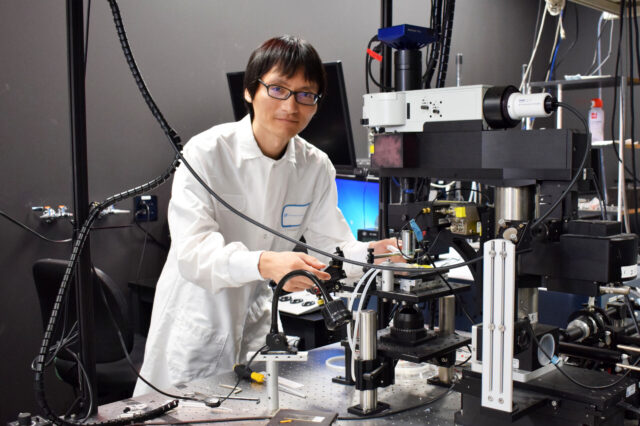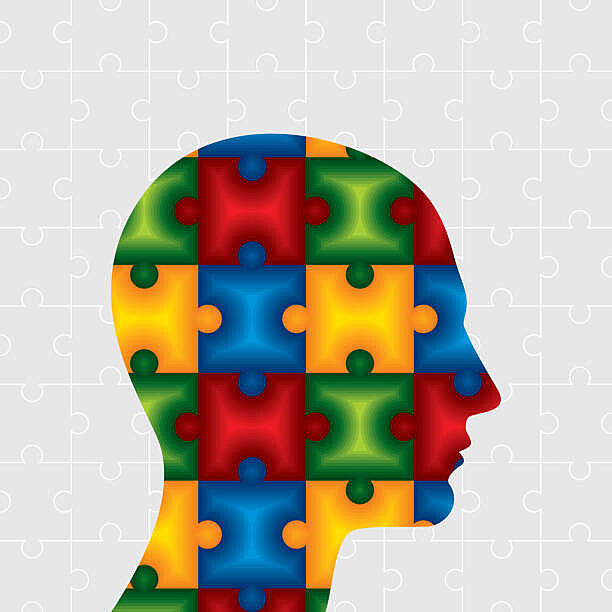Definition
Autism spectrum disorder (ASD) is a neurodevelopmental disorder that affects a person’s ability to communicate and interact with others, regulate emotions, and tolerate changes in routine and one’s environment. Symptoms of ASD typically appear in the first two years of life.
Alternative Names
Autism; Autistic disorder; Asperger disorder; Pervasive developmental disorder
Causes and Risk Factors
Scientists don’t know the exact causes of ASD. However, research suggests that genes and environmental influences affect development in ways that lead to ASD.
Boys are four times more likely to be diagnosed with autism than girls. However, some research suggests that girls may not show autism in the same way as boys and might go undiagnosed as a result.
ASD also occurs more frequently among individuals who have certain medical conditions, including fragile X syndrome, Down syndrome, tuberous sclerosis, and congenital rubella syndrome.
While there has been speculation that vaccines cause autism, extensive research by scientists for the past two decades has determined there is no link between vaccines and autism.
Risk factors for ASD include:
- Having a sibling with ASD
- Having older parents
- Pregnancy and birth complications (e.g. low birth weight, multiple pregnancies [twins, triplets, etc.], prematurity)
Signs and Symptoms
The behaviors of ASD often become apparent to parents by in early childhood. Children with ASD have difficulty with social communication and interaction, restricted interests, and repetitive behaviors.
People with ASD may not understand or appropriately use:
- Spoken language (around a third of people with autism are nonverbal)
- Gestures
- Eye contact
- Facial expressions
- Tone of voice
People with ASD may have difficulty with:
- Recognizing emotions and intentions in others
- Regulating or expressing one’s own emotions
- Maintaining back and forth of conversation
- Maintaining eye contact
- Gauging personal space
People with ASD may have restricted and repetitive behaviors such as:
- Repetitive body movements (e.g. rocking, spinning, running back and forth)
- Repetitive motions with objects (e.g. spinning wheels, shaking sticks, flipping levers)
- Ritualistic behaviors (e.g. lining up objects, repeatedly touching objects in a set order)
- Narrow or extreme interests in specific topics
- Getting upset by slight changes in a routine
- Being more or less sensitive than other people to sensory input, such as light, noise, clothing or temperature
Not all people with ASD will show all behaviors, but most will show several.
Testing
The American Academy of Pediatrics recommends that all children get be screened for autism at their 18- and 24-month routine exams – and whenever a parent or doctor has concerns. Additional screening may be needed if a child is at a high risk for ASD.
Screening does not diagnose ASD. Rather, it flags behaviors often associated with the condition.
Children who show developmental problems during this screening process will be referred to a specialist for a diagnostic evaluation.
If a full evaluation is recommended, seeking expert assessment using an evidenced-based instrument (i.e. Autism Diagnostic Observation Schedule [ADOS]) is preferred. Due to the complex and wide range of skills and impairments of those living with ASD, a comprehensive evaluation is required. The evaluation may examine:
- Cognitive level or thinking skills
- Language abilities
- Social interactions
- Age-appropriate skills needed to complete daily activities independently, such as eating, dressing and toileting
A medical diagnosis is made by a physician based on an assessment of symptoms and diagnostic tests. A diagnosis of ASD is made by a physician according to the Diagnostic and Statistical Manual of the American Psychiatric Association (DSM 5).
The earlier an ASD diagnosis is made, the sooner appropriate educational and treatment programming can begin.
Treatment
Treatment for ASD should begin as soon as possible after diagnosis. Early treatment can reduce individuals’ difficulties while helping them learn new skills and make the most of their strengths.
Every child or adult with autism has unique challenges. Thus, there is no one-size-fits-all approach to ASD treatment and intervention.
Intervention can involve behavioral treatments, medications, or both.
Behavioral treatments include:
- Applied Behavior Analysis (ABA)
- Early Start Denver Model (ESDM)
- Occupational Therapy (OT)
- Speech-Language Pathology Therapy (SLP/ST)
- Pivotal Response Treatment (PRT)
- Relationship Development Intervention (RDI)
- Social Skills Training
Medication may treat some symptoms that are common with ASD, such as:
- Irritability
- Aggression
- Hyperactivity
- Attention problems
- Anxiety and depression
- Sleep
- Appetite disturbance
- Constipation
- Seizures
Support Groups:
The stress of being a caregiver of a person living with ASD can be overwhelming. Social and emotional problems for families, caregivers, and siblings are important to be addressed. There are many support and social groups in Alachua and surrounding Florida counties that offer support to people with ASD and their loved ones.
Associated Conditions:
A range of physical and mental-health conditions frequently accompany autism. They include, but are not limited to, the following:
Outlook (Prognosis)
ASD is a lifelong condition. However, with proper treatment and support, many ASD symptoms can be improved and many individuals with ASD may be to live with their families or in the community.
When to Contact a Medical Professional
Parents usually suspect that there is a developmental problem long before a diagnosis is made. Call your provider if you think that your child is not developing normally.


